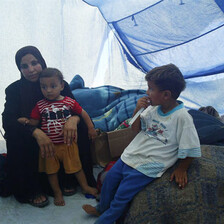The Electronic Intifada Rafah 24 May 2012

Um Hasan and her family were forcibly displaced from their village in 1948.
The Electronic IntifadaMaryam al-Hout (known as Um Hasan) is in her late eighties but she still welcomes customers to a furniture store run by her grandson Mohammad. Selling mattresses, cushions and carpets, the store is located in the southern Gaza Strip city of Rafah.
Um Hasan was forced to leave her home village of Julis during the Nakba (catastrophe), the systematic ethnic cleansing that led to Israel’s foundation in 1948. Before then, she was living there with her husband Abu Hasan (since deceased) and her parents. Julis is located near Asqalan, which is now the city of Ashkelon in present-day Israel.
“The Israeli forces entered the nearby Beit Daras village, then we moved to Asqalan, where we stayed about six months,” Abu Hasan recalled. “Afterwards, we heard horrible things about a town near Jerusalem known as Deir Yassin. We heard that men, women and children were slaughtered. As our fears got bigger, the men of Julis, including my husband, Abu Hasan, managed to get some rifles to defend us.
“We were told that in Asqalan and villages nearby, there were Arab and Egyptian armed forces who came over to Palestine to defend the country. By then, the whole village of Julis, including my extended family, my two sons, my husband and I, had left Julis A few elderly people stayed put. We stayed in Asqalan until the war stopped. Of course, the Arab armies were defeated and we were forced to leave for the nearby Gaza Strip.
“We travelled by a rented camel until we reached Rafah. In Rafah, we stopped at the Tal Zorob hill, until UNRWA [the UN agency for Palestine refugees], came to distribute some blankets and food. We were hundreds of people. A few days later, UNRWA helped erect tents for us. That would have been towards the end of the summer of 1948.”
Julis had a population of 1,030 people in 1945, according to Walid Khalidi’s authorative record of the Nakba, All that Remains. On the night of 27-28 May 1948, the Givati Brigade of the Haganah, the Zionist militia that was later renamed as the Israeli army, first occupied part of the village. Julis was totally occupied by 10-11 June.
Happy childhood
Um Hasan had a happy childhood. “When I was five years old, I used to join relatives during harvests of wheat, grapes and figs. Julis was like a paradise, my son.
“My father used to have two farms, one with figs and the other with grapes. We were farmers by heritage. Our home in Julis was made from mud and I used to get water for drinking from a well in our farmland. Thank God, we used to have heavy rains and we used to make bread out of barley or wheat, using a fire stove made of mud called a taboun.
“My parents, my grandmother and my five sisters and two brothers all used to live in the same three-room home. When I was a child, I used to bring some wood from a nearby small forest, along with my friends. During the trip to the forest we used to sing folk songs.”
“Jules had a maqad, something like a city hall, where the men used to sit and enjoy chatting and listening to some old folk music. Also, they used to discuss some local issues, like disputes or family problems.
“At festival times for Muslims, women used to make cakes the evening before the feast. Women used to make sweets, like white sweets and Syrian sweets. We used all to go to the beach, bringing sweets and dishes like maftoul [couscous], with us.”
Engaged, but apart
Um Hasan recalls how her marriage to her husband Abu Hasan was arranged.
“One day a man came to visit my father and asked him if I could get married to his son. After I got engaged to Abu Hasan, we didn’t see each other for four months. Can you imagine? To get married to me, his family paid a dowry of 70 Palestinian pounds.
“I remember well that my wedding party was mainly for the men. My father and my brothers stayed some time celebrating with my father-in-law’s family, including my groom, Abu Hasan, may he rest in peace.”
Following more than six decades of displacement, Um Hasan still dreams of returning to Julis.
“I hope that not only myself, but all who live in the refugee camps here in Gaza, will one day march back to Palestine, to our ancestors’ land, no matter what the reaction of Israel will be.”
Rami Almeghari is a journalist and university lecturer based in the Gaza Strip.





